|
|
|
Sort Order |
|
|
|
Items / Page
|
|
|
|
|
|
|
| Srl | Item |
| 1 |
ID:
151250
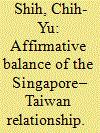

|
|
|
|
|
| Summary/Abstract |
The relational turn of IR stresses the processual constitution of the state. The indigenous theory of Chinese IR adopts the relational turn but contends that the Chinese experiences are distinctive. Relying on the case of Singapore-Taiwan relationship, this paper argues that the Chinese relationality attests to a bilateral sensibility that does not confront the relational turn in general, which is multilateral. The case further contributes to the relational turn in showing non-security and affirmative components of relationality to the extent that the studies of the relational turn have remained embedded in the security concerns. The case applies the theory of “balance of relationship,” in which nations can practice self-restraint not in response to unilateral strategic calculus or multilateral rule making, but to bilateral reciprocity. The balance of relationship of the two proceeds at both the statist and the personal levels, introducing the affect of passion to the relational turn.
|
|
|
|
|
|
|
|
|
|
|
|
|
|
|
|
| 2 |
ID:
111636
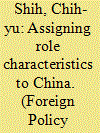

|
|
|
|
|
| Publication |
2012.
|
| Summary/Abstract |
This paper distinguishes and integrates national identity and national image through a deep role analysis. It argues that the meaning of China's rising rests upon the views of those who evaluate China's role playing. This role analysis mediates between international relations and Chinese foreign policy. It also mediates between China watchers and their China. The two dimensions of role-role taking and role making-generate four different discursive approaches to interpreting the rise of China, each in its own way associated with the affects of opportunity and threat. They are "nation state,""civilization,""Tianxia," and "Asianism." In response to the external view on the rise of China, Chinese narrators often take the Tianxia and nation state approaches as components of their conception of national role. These conceptions mediated by role-making and role-taking, evolve into four possible strategic focuses-national interests, imperialism, sovereignty and center-periphery. While this last strategic focus on role-taking has recently attracted enthusiastic response in China, it has been re-appropriated by social science concepts such as soft power and social capital that assume an egoistic role-making China is on the move.
|
|
|
|
|
|
|
|
|
|
|
|
|
|
|
|
| 3 |
ID:
137519
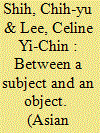

|
|
|
|
|
| Summary/Abstract |
Late Pao-kun Kuo in Singapore and contemporary Denny Yung in Hong Kong have made articular ontological and epistemological choices in their experimental theater in the context of the de-colonization and rise of China. We gather, between the two sites, a possible dichotomy in the representation of China: China as a collective subject to accommodate the changing world and China as an individualized object that emerges in each narrator’s chosen perspective. Kuo intends to prompt the audience to reconnect with something greater than their individuality. For Kuo, the crisis is the loss of cultural subjectivity and the privileging of transcendence over individualized meanings of life. For Yung, cultural subjectivity is no longer a question after the return of Hong Kong to China. Yung painstakingly generates the legitimacy and capacity of individual Hong Kong people to have faith in their own ways of transcending any version of the entirety of China
|
|
|
|
|
|
|
|
|
|
|
|
|
|
|
|
| 4 |
ID:
066918
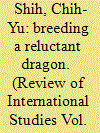

|
|
|
| 5 |
ID:
138164
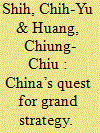

|
|
|
|
|
| Summary/Abstract |
As China’s power steadily rises, mutual role expectations between China and the United States become increasingly unstable. To ensure a mutually agreeable role for China, Chinese grand strategy has the double mission of presenting China as an accepted and respected matching power and of assuring the incumbent hegemonic power that China is a role-player. We apply the notion of national role style to analyse China’s grand strategy. We argue that China adopts the sociological role conception and examines the grand strategy of the rising power accordingly. Through examining China’s policy towards US arms sales to Taiwan, we show how a role-playing China has tried to execute a grand strategy to coach the incumbent hegemonic power into acknowledging China’s rise to the status of a matching power. We argue that the importance of maintaining a stable relationship with the United States has trumped China’s core national interest of unification, pertaining to US arms sales to Taiwan. In practice, China treats arms sales as a bilateral issue, and would rather appeal to sociological role expectations through a bilateral convention than through any general value. The United States, on the other hand, despite its willingness to cope with China in an exclusively bilateral format, has always tried to push China to accept universal rules at the expense of the alleged national differences between the two countries, thereby defeating the sociological role expectation.
|
|
|
|
|
|
|
|
|
|
|
|
|
|
|
|
| 6 |
ID:
172799
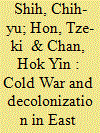

|
|
|
|
|
| Summary/Abstract |
This special issue contributes to the study of decolonization and the Cold War by tackling their interactions and framing them into comparable topics. Collectively, we explore how decolonization has proceeded during the Cold War—discovering the impacts of the Cold War, tracing the agency at post-colonial sites for adaptation under the impacts of the Cold War, and acknowledging the uneven consequences the Cold War engendered for decolonization. Theoretically, decolonization in East Asia takes place in three different spheres of relations—international, interethnic, and subaltern. 1) International relations: This sphere involves complex role relations between former colonies as security allies, economic entities, colonial rivals, historical neighbors, and cultural acquaintances. 2) Interethnic relations: This sphere attends to mutual respect and equality between territorially internal groups that have been divided since colonial times. 3) Subaltern relations: The third sphere involves the peculiar relations wherein former colonies find inspiration from each other or support one another to attain political and economic autonomy. In terms of theoretical approaches, the authors adopt historical, discursive, narrative, political economics, postcolonial, and international relations perspectives.
|
|
|
|
|
|
|
|
|
|
|
|
|
|
|
|
| 7 |
ID:
163450
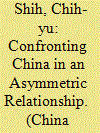

|
|
|
|
|
| Summary/Abstract |
�is study seeks to explain how a weaker party could decide on its own
to confront a stronger party. �e weaker party relies on relational turn
in international relations to provide an alternative to the realist view.
On the basis of relational turn, which stresses the importance of
discovering the processual mechanisms of behavior instead of the
structure or corelationship among variables, this study o�ers an empirically based speculation of the plausible psychological mechanisms that
enable a weaker party in Taiwan to resort to confrontation against a
stronger party in China. �ese psychological mechanisms are arguably
necessary processes that lead to confrontational policy. This study
argues that a small party is epistemologically equal to its stronger
counterpart in relational coupling. �is assumption is based on prior
understandings that constitute the identities of both parties. The
former exerts agency for confrontation when acting upon the senses of
e�cacy, determination, and/or legitimacy that are embedded in relational coupling.
North Korean Leader Kim Jung Un executed his uncle Jang Song-thaek
for treason on 13 December 2013. �e execution was conducted in the
most theatrical fashion and was seemingly designed for the entire world
to see. Jang was a top-ranking pro-China veteran who believed in the
Chinese style of reform. A year before, Jang was still collaborating with
|
|
|
|
|
|
|
|
|
|
|
|
|
|
|
|
| 8 |
ID:
053725
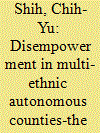

|
|
|
| 9 |
ID:
135419
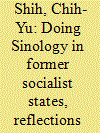

|
|
|
|
|
| Summary/Abstract |
The study of China in each of the former socialist states has a long tradition in the humanities. Before the socialist period, the philological tradition was based largely on the legacy of French sinology. During the
socialist period, China Studies adopted scientific principles in accordance with Marxist perspectives, but these were primarily superimposed without any intellectual roots among sinologists. Such was the case in
Czechoslovakia, Mongolia, Poland, Russia, Vietnam, and the other socialist environments. The humanities were considered part of scientific research, thus making for a situation quite different from that in Western, primarily American, institutions of higher education, where the social sciences and the humanities were two different kinds of basic research, with their own epistemological assumptions and methodological approaches.
|
|
|
|
|
|
|
|
|
|
|
|
|
|
|
|
| 10 |
ID:
172804
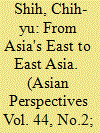

|
|
|
|
|
| Summary/Abstract |
The disappearance of references to "Yadong," Asia's East or Asiatic East, as opposed to East Asia, in Taiwan's post-World War II (WWII) political history presaged the impracticality of decolonization in Taiwan. The Cold War, pertaining especially to the American intellectual intervention in the conceptualization of the world through the fault line of its containment policy, contributed greatly to the substitution of East Asia for Yadong. I argue that Yadong is a geocultural lens, while East Asia connotes strategic purposes of various kinds. The latter concept echoed the discourse of the "Great East Asian Co-prosperity Sphere," which colonial Japan relied on before and during WWII to justify colonialism as well as expansion. The familiar discourse of decolonization embedded in "strategic essentialism," i.e. deliberate use of some fundamentalism for the occasion of resistance, reproduces the colonizing/colonized binary. I re-theorize decolonization as a relational project. Empirically the intellectual demise of Yadong as a relational discourse accompanied the evolution of the Cold War. Yadong's disappearance indirectly testifies to the fate of decolonization in Taiwan.
|
|
|
|
|
|
|
|
|
|
|
|
|
|
|
|
| 11 |
ID:
160241


|
|
|
|
|
| Summary/Abstract |
The Sino-Pakistani relationship illustrates a truly relational identity. It involves two relational selves constituting each other, and the formation of the China-Pakistan Economic Corridor (CPEC) independently constituting each of them. Both the study and the presentation of this relational identity are only possible under an epistemology of relationality, as opposed to the epistemology of the self-interested actor. The article enlists the anthropological notion of post-Chineseness, which typologises relationality in accordance with how Pakistan and China identify each other in their strategic choice of relationship. It finds that China has moved from its expectations of Pakistan as being an owner of physical Chineseness, through hybrid Chineseness, and ultimately progressing to moral Chineseness under the CPEC. By contrast, Pakistan’s self-positioning vis-à-vis China has shifted from the ownership of physical Chineseness, via experiential Chineseness, to moral Chineseness. Among them, experiential Chineseness is the most relevant element in explaining the changing bilateral relationships under the epistemology of relationality. It is the spontaneous rise of intimacy, or friendship, made possible by the long-term process of a collegial working relationship.
|
|
|
|
|
|
|
|
|
|
|
|
|
|
|
|
| 12 |
ID:
134184
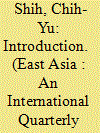

|
|
|
|
|
| Publication |
2014.
|
| Summary/Abstract |
Southeast Asian studies of Chinese humanities are intertwined with the changing discourses and practices of Chineseness of indigenous Chinese residents. However, scholars rarely encounter this subject. Humanity and pragmatism are two distinctive features of how intellectuals of Southeast Asia understand China and Chineseness in the twenty-first century. These features emerge because descendants of Chinese historical migrants comprise a significant portion of the population in Southeast Asian countries. The strategy of survival and development of the descendants, along with their evolving self-understanding, inevitably affects the perspectives on China and Chinese studies in their countries. These studies simultaneously implicate subjectivity, which pertains to how authors and their readers position themselves among ethnic, national, and civilizational identities.
|
|
|
|
|
|
|
|
|
|
|
|
|
|
|
|
| 13 |
ID:
137514
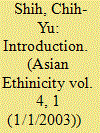

|
|
|
| 14 |
ID:
137515


|
|
|
|
|
| Summary/Abstract |
Scholarship on humanities in Southeast Asia done by Chinese descendants is significantly different from the work of diasporic Chinese scholars in North America. The latter is divided by strategic choices of scholars as to how to represent Asian and Chinese Americans, who presumably struggle for recognition and equality in the Anglo-Saxon mainstream. Several nstances have shown an unwanted sense of inferiority. Scholarship of one choice may inadvertently expose, arouse, or reproduce this sense of inferiority among those scholars making a different choice.
|
|
|
|
|
|
|
|
|
|
|
|
|
|
|
|
| 15 |
ID:
129452
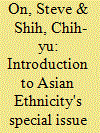

|
|
|
|
|
| Publication |
2014.
|
| Summary/Abstract |
Twenty-five years and counting, since Will Kymlicka's first book-length intervention in 1989,1 statements championing the politics of recognition and/or difference have emerged along with statements challenging the liberal accommodation of minority cultures.2 Falling under the broad description of multiculturalism, this genre of literature has gained traction in the mainstream and beyond. Today at least three specialized areas of research have been developed sometimes in opposition to and sometimes overlapping with liberal multiculturalism: feminist criticisms of multiculturalism,3 multiculturalism as antiracism, 4 and multiculturalism in Asia.5 Taking cue from, but not delimiting to, the last and burgeoning strand of multiculturalism, this special issue seeks to draw particular attention to three interrelated phenomena of ethnicities, governance, and human rights in Asia. Although these three topics have often been discussed in political science and sociology journals, rarely have they been examined in one setting. Moreover, these three issues tend to be subsumed under the broad descriptions of post-colonialism, nationalism, state-building, and development; they are largely incorporated into monograms on justice, democracy, rights, the state, culture, and equality. That is, despite their importance, the three themes have not been brought together.
|
|
|
|
|
|
|
|
|
|
|
|
|
|
|
|
| 16 |
ID:
169122
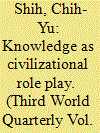

|
|
|
|
|
| Summary/Abstract |
Colonial and postcolonial relations have always constituted sites of knowledge production in the Global South. This is particularly noticeable when it comes to the production of knowledge of a Global South self vis-à-vis the West. However, the literature has not seriously attended self-knowledge production in the Global South with regard to non-Western others. The paper compares South and Southeast Asian think tanks to reflect upon a common identity strategy of small nations to become a civilizational bridge between competing major neighbours. Specifically, China experts in these areas host more or less a common wish or even a desire to be a bridge over the difference of China and its potential rival in India, the West, or both. The bridge role is a rare sensibility in the postcolonial critique of the West. Watching China from its Southern Third World neighbourhood incurs such an agenda. Relying on interviews of retired diplomats and think tank experts, the paper also discusses how the abovementioned methodological characteristics affect the enactment of the bridge role.
|
|
|
|
|
|
|
|
|
|
|
|
|
|
|
|
| 17 |
ID:
157522
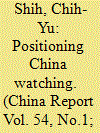

|
|
|
|
|
| Summary/Abstract |
This article divides China watching by the two dimensions of position and purpose. By position, the article asks if a narrator looks at China from an external or an internal perspective. By purpose, it asks if the narrative is to critically provide an evaluative perspective, to objectively represent an authentic China, or to practically discuss a life and identity strategy of Chinese people. Specifically, the complex sensibilities towards China among Taiwanese migrant scholars reify the genuine and yet often-unnoticed agency required to proceed with writing on China. With initially both the Chinese Civil War and later pro-independence politics in Taiwan poisoning relationships with China, the politically divided Taiwanese scholars enter a different environment in Hong Kong, which urges neither total confrontation nor complete loyalty in approaching China. How the Hong Kong circumstances have impacted upon the choices of these Taiwanese intellectuals in their presentation of the subject matter of China, in comparison with their other colleagues in Hong Kong, is the primary goal of the following discussion.
|
|
|
|
|
|
|
|
|
|
|
|
|
|
|
|
| 18 |
ID:
179778
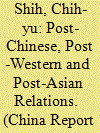

|
|
|
|
|
| Summary/Abstract |
Arguing that studies of China must simultaneously be studies of East Asia, this article offers a philosophically critical reflection on the meaning of Chineseness in lieu of the theme of the special issue—East Asia. The two regions are reciprocally holographical of each other. The latter part of the article will further propose a research agenda of post-Asianness. I hope to convey a message that is hidden but strong: that East Asia is a redundant agenda and yet fungible at the same time. This ontological irony can be likewise applied to both Chineseness and Asianness. Ultimately, China, East Asia and Asia are mainly strategic agendas and identities. The critical reflections outlined in this article are intended to display, facilitate and complicate the pluriversality of all post-identities.
|
|
|
|
|
|
|
|
|
|
|
|
|
|
|
|
| 19 |
ID:
158091
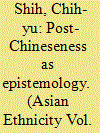

|
|
|
|
|
| Summary/Abstract |
The current study relies on the social psychological notion of altercasting and the anthropological notion of post-Chineseness to appreciate the identity strategies of the Philippine’s China watchers. Basically, the case study suggests that the attainment of the sympathetic capacity to understand China can enrich the knowledge of those China watchers coming from an external position. However, adhering to an internal position of China watching would disempower ethnic Chinese scholars in the Philippines in fully participating in the indigenous community. Therefore, in the long run, the trend is for all ethnic scholars to establish distance from internal perspectives on China and practice watching China from the outside from time to time.
|
|
|
|
|
|
|
|
|
|
|
|
|
|
|
|
| 20 |
ID:
123968
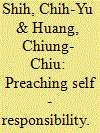

|
|
|
|
|
| Publication |
2013.
|
| Summary/Abstract |
The present study traces the cultural and political contexts within which Beijing considers global governance. They include: (1) Confucian dispositions toward non-interventionism and self-governance; (2) the socialist collectivist ethics that stress persuasion instead of unilateralism; (3) a lingering sense of inferiority arising from underdevelopment that harms self-confidence; and (4) the repugnant experiences with the United Nations (UN) and the United States that have dominated most international organizations since World War II. The consequential Chinese style of global governance is reactive rather than proactive, problem-solving rather than goal-driven, and attentive to obligation and reform more in other major countries than in failing states. That said, China could still assert global leadership by acting as a model of self-governance for other major countries and by intervening in failing states only through closed-door persuasion and exemplification as opposed to open sanctioning.
|
|
|
|
|
|
|
|
|
|
|
|
|
|
|
|
|
|
|
|
|